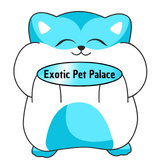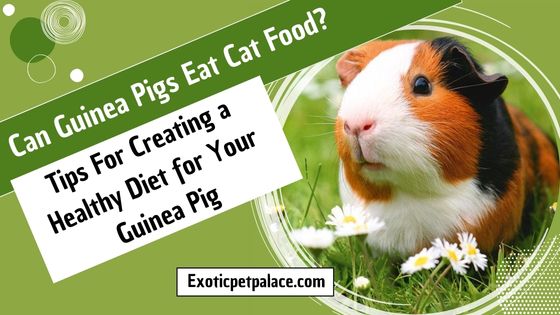Guinea pigs, those cute and noisy little animals, have won the hearts of pet owners for centuries.
However, they must follow a specialized diet to keep these furry pals healthy.
Guinea pigs have extremely different nutritional demands.
This article delves into the dietary requirements of guinea pigs, explores “Can Guinea Pigs Eat Cat Food?” and guides creating a balanced and healthy diet for your cavy (another name for guinea pigs).
Let’s start,
Also Read:
🐾Can Guinea Pigs Eat Hamster Food?
🐾Can Guinea Pigs Eat Rabbit Food?
Understanding the Guinea Pig Digestive System
Guinea pigs are herbivores, which means their digestive tract is adapted to consume plant-based foods.
Unlike carnivores such as cats, they lack the enzymes and intestinal flora required to breakdown animal protein.
Their digestive tract works best with a high-fiber diet that includes hay, fresh vegetables, and a modest amount of high-quality pellets.
Here’s a breakdown of how a guinea pig’s digestive system works:
Gut Flora:
Guinea pigs rely significantly on gut flora to digest their diet and extract nutrients. Unlike cats, their gut bacteria thrive on fiber-rich meals.
Cecum:
This enormous pouch in the guinea pig’s digestive system contains a distinct population of bacteria that ferments plant stuff, making important nutrients available.
Coprophagy:
It may sound unusual, but guinea pigs practice coprophagy, which involves swallowing a certain form of soft droppings generated at night.
This permits them to better absorb the vitamins and bacteria generated by their gut flora.
So, now the question is Can Guinea Pigs Eat Cat Food?.
Let’s discuss.
Can Guinea Pigs Eat Cat Food?
Guinea pigs shouldn’t eat cat food.
While cat food is not harmful and a tiny accidental taste is unlikely to damage them, it does not meet their nutritional requirements.
Guinea pigs are strict herbivores and cannot digest the animal proteins included in the cat diet.
Feeding them cat food can create digestive problems and nutritional imbalances, resulting in poor health.
Guinea pigs cannot make vitamin C on their own, therefore it is critical to provide them a nutritious diet that includes hay, fresh vegetables, and guinea pig pellets supplemented with vitamin C.
If you run out of guinea pig food, offer them fresh vegetables or fruits that are suited for their diet rather than cat food.
You may be wondering that if cat’s food is not toxic than why guinea pig cannot eat cat’s food?
Let’s discuss What Is the Difference Between Cat and Guinea Pig Food?
Why Cat Food is Harmful for Guinea Pigs?
Cat food is designed to meet the nutritional requirements of obligate carnivores, which means cats need animal protein to survive.
Here’s why guinea pigs don’t do well on cat food:
👉High Protein Content: Cat food contains a much higher protein content than what guinea pigs need. This can overload their kidneys and lead to serious health problems.
👉Lack of Fiber: Cat food is generally low in fiber, which is crucial for maintaining healthy gut function and preventing digestive issues in guinea pigs.
👉Imbalance of Nutrients: Cat food caters to feline nutritional needs, lacking essential vitamins like vitamin C, which guinea pigs can’t synthesize on their own.
Here is difference between cat and guinea pig food.
| Nutrients | Cat Food | Guinea Pig Food |
|---|---|---|
| Fat | 40% fat | Much lower fat intake compared to cats |
| Carbohydrates | 1-2% | 40-50% carbohydrates |
| Protein | Rich in animal protein | Much lower animal protein intake compared to cats |
| Vitamins C | Cats and dogs don’t have a requirement of vitamin C in their diet. | Rich in vitamins (esp. Vitamin C) |
| Fiber | Less amount | High amount |
Can Eating Cat Food Make Your Guinea Pig Sick?
Yes, consuming cat food can make your guinea pig ill.
While cat food is not harmful to guinea pigs, it is inappropriate for their digestive system and nutritional requirements.
If a guinea pig eats cat food in big quantities or on a frequent basis, it may have digestive distress and nutritional imbalance.
Feeding guinea pigs cat food can lead to a variety of health problems, including:
Digestive Issues: Diarrhea, constipation, and gas can occur due to the inability to properly digest the food.
Malnutrition: Deficiencies in vital vitamins and minerals, particularly vitamin C, can cause problems like scurvy, weight loss, and lethargy.
Dental Problems: The high protein and fat content can contribute to dental issues like overgrown teeth and malocclusion (improper jaw alignment).
Bloat: A potentially life-threatening condition caused by gas buildup in the digestive system.
If your guinea pig has eaten cat food, you should constantly check their health for the next 24 hours and make sure they have access to their regular diet of hay, fresh vegetables, and guinea pig pellets.
If you observe any indications of disease or suffering, contact a veterinarian.
It is recommended to keep cat food out of reach of your guinea pig to avoid inadvertent intake.
To learn more about “Exotic pets” Visit our YouTube Channel.👇
Signs Your Guinea Pig Might Have Eaten Cat Food
If you suspect your guinea pig has eaten cat food, it’s important to be aware of the following signs:
- Loss of appetite: This is a common indicator of digestive upset.
- Lethargy: A decrease in activity level can signal discomfort or illness.
- Diarrhea or constipation: Changes in bowel habits are a red flag.
- Bloating: A distended abdomen is a serious symptom requiring immediate veterinary attention.
- Weight loss: This can be caused by malnutrition or difficulty digesting food.
If you notice any of these signs, take your guinea pig to a veterinarian right away.
Early intervention can prevent serious health complications.
Tips For Creating a Healthy Diet for Your Guinea Pig
Now that you understand the dangers of cat food, let’s explore what your guinea pig needs to thrive:
Unlimited Hay:
Hay should be the staple of your guinea pig’s diet. It contains necessary fiber for proper digestion and helps to keep their teeth worn down. Choose high-quality grass hay, such as Timothy or Oat hay.
Fresh Vegetables:
Fresh veggies include vitamins, minerals, and water that are required on a daily basis. Select a range of guinea pig-friendly foods such as bell peppers, romaine lettuce, carrots, and parsley.
High-Quality Pellets:
A modest amount (1/8 cup daily) of high-quality guinea pig pellets can provide additional nutrients to their diet. Look for pellets high in vitamin C and fiber.
Limited Treats:
Occasional treats like small pieces of fruit or commercially available guinea pig treats are okay, but keep them to a minimum. Avoid sugary treats and anything containing nuts or seeds.
Provide fresh water daily:
Water is essential for overall health. Use a clean water bottle with a sipper tube and monitor water intake regularly.
Monitor their weight:
Regularly weigh your guinea pig to ensure they maintain a healthy weight.
Consult your veterinarian:
Discuss your guinea pig’s diet with your vet for personalized recommendations based on their age and health.
A healthy diet is just one aspect of proper guinea pig care.
Here are some additional factors to consider:
- Guinea pigs need a spacious cage with plenty of room to exercise and explore. Provide them with hiding spots, bedding, and chew toys.
- Guinea pigs are social creatures and thrive with a friend. Consider adopting another guinea pig of the same sex for companionship.
- Provide opportunities for daily exercise. Allow them time outside their cage in a safe, guinea pig-proofed area.
- Regularly clean your guinea pig’s cage to prevent the buildup of ammonia, which can irritate their respiratory system.
- Brush their fur regularly to prevent matting and maintain overall hygiene.
I hope know it is care that guinea pig can not eat cat food, but can they eat dog food? 🤔
Let’s learn:
Can Guinea Pigs eat dog food?
No, guinea pigs absolutely cannot eat dog food. Here’s why:
Here is why,
- Guinea pigs are herbivores, meaning their digestive system is designed to process plant-based materials.
- Dog food, formulated for omnivorous or carnivorous canines, is too high in protein and fat for guinea pigs.
- Dog food lacks essential nutrients crucial for guinea pigs, particularly vitamin C, which they cannot synthesize on their own.
- The high protein and fat content in dog food can cause digestive problems like diarrhea, constipation, and gas in guinea pigs.
- The composition of dog food might contribute to overgrown teeth and other dental issues in guinea pigs.
To learn more about Exotic pets, like sugar glider, guinea pigs, and hamsters.
Follow us on Instagram👇
If you suspect your guinea pig has eaten dog food, monitor them closely for signs of discomfort like:
- Loss of appetite
- Lethargy
- Diarrhea or constipation
- Bloating
- Weight loss
If you notice any of these signs, take your guinea pig to a veterinarian immediately.
Here’s a quick comparison of dietary needs between guinea pigs and dogs:
| Nutrient | Guinea Pigs | Dogs |
|---|---|---|
| Diet | Herbivores | Omnivores/Carnivores depending on breed |
| Protein | Low (plant-based) | Moderate to High (animal-based) |
| Fat | Low | Moderate to High |
| Fiber | High | Moderate |
| Vitamin C | Essential (cannot synthesize) | Not essential |
List of Foods Guinea Pigs Should Avoid:
Here is the list of food to avoid:
Cat Food: Absolutely not! Cat food is too high in protein and fat for guinea pigs and lacks essential nutrients like vitamin C.
Dog Food: Similar to cat food, dog food is not suitable for guinea pigs due to its protein and fat content and lack of vital nutrients.
Sugary Treats: These can lead to weight gain and other health problems.
Dairy Products: Guinea pigs cannot digest lactose and dairy products can cause digestive upset.
Chocolate: Toxic for guinea pigs.
Avocado: Contains persin, which is toxic to guinea pigs.
Rhubarb: The leaves contain oxalic acid, which can be harmful.
Important Considerations:
Water is essential for overall health. Use a clean water bottle with a sipper tube and monitor water intake regularly.
Always wash all vegetables thoroughly to remove any pesticides or dirt.
A balanced diet is key.
While hay is the foundation, fresh vegetables and a small amount of pellets provide essential vitamins and minerals.
Discuss your guinea pig’s specific dietary needs with your veterinarian for personalized recommendations based on their age and health.
Conclusion:
Guinea pigs are adorable and require specific care to thrive.
Their dietary needs differ vastly from those of cats.
Remember, cat food is not an option – it lacks essential nutrients and can cause serious health problems.
Focus on providing a diet rich in hay, fresh vegetables, and high-quality pellets.
Combined with proper housing, companionship, and hygiene, you can create a loving environment for your furry friend.
If you have any further questions about your guinea pig’s diet or health, consult your veterinarian for personalized advice.
Take care of you sweet pigs.🐾🐾

